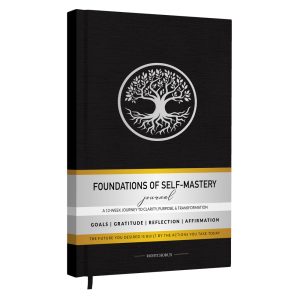A growth mindset journal is more than just a notebook—it’s a powerful daily ritual that helps you challenge self-doubt, embrace learning, and rewire limiting beliefs.
By reflecting on your thoughts and actions with curiosity instead of judgment, a growth mindset journal creates the space for authentic self-discovery and steady transformation.
If you’re striving to live more intentionally, this practice can open the doorway to lasting clarity, confidence, and joy.
In this article, we’ll explore how to start a growth mindset journaling practice, why it matters, and how you can use it to define meaningful goals and reframe inner narratives.
Whether you’re brand new to journaling or ready to take things deeper, we’ll also introduce tools—like the thoughtfully designed Foundations of Self-Discovery Mastery Journal—to help you stay consistent and inspired every step of the way.
Foundations of Self Discovery & Mastery Journal: A 13-Week Personal Development Journal System
$29.95
The Foundations of Self Discovery…
Table of Contents
What is a Growth Mindset Journal and Why It Matters?
A growth mindset journal supports personal evolution by helping you shift from fixed, self-limiting beliefs to empowered growth-oriented thinking.
Grounded in Dr. Carol Dweck’s research, the concept of “growth mindset” emphasizes that abilities and intelligence are not static traits—they can be developed through effort, feedback, and reflection.
Daily journaling is one of the most accessible, effective ways to integrate this mindset into your life.
Writing daily helps track lessons learned, monitor how you respond to adversity, and solidify forward momentum.
Unlike passive reflection, a growth mindset journal builds awareness through deliberate attention.
Here’s how a consistent mindset journaling habit fuels your personal transformation:
- Reinforces positive internal dialogue and reframes negative thoughts.
- Tracks emotional progress and uncovers subconscious patterns.
- Helps you recognize the value of effort over perfection.
- Improves self-discipline and stress resilience.
By carving out even a few mindful minutes to journal each day, you train your mind to focus on growth over fear, possibility over procrastination.
Understanding Fixed vs. Growth Mindset
The difference between a fixed and growth mindset can shape everything from your career path to your relationships.
Those with a fixed mindset believe traits like intelligence or talent are unchangeable, often leading to avoidance of challenges or fear of failure.
In contrast, a growth mindset encourages curiosity, effort, and learning from mistakes.
Journaling gently encourages you to evaluate how you think about your abilities and potential.
When you identify a fixed mindset statement—such as “I’m just not good at this”—you can write about the experience, then reframe it with a growth-oriented insight like, “I can improve with practice.”
Over time, journaling reshapes self-narratives by consistently honoring learning, not perfection. This helps you commit to objectives with more hope, creativity, and personal accountability.
Daily Journaling as a Growth Mindset Habit
Creating a daily growth-focused journaling habit builds mental and emotional agility.
It makes your self-awareness muscle stronger—and it does so in a way that’s compassionate, curious, and non-performative.
The Foundations of Self-Discovery Mastery Journal is structured around this principle with built-in reflection prompts, motivational affirmations, and intentional space to note what went well and what can improve.
Anchoring your day with journaling allows you to:
- Identify recurring fears or limiting thoughts.
- Celebrate small wins and contributions.
- Reinforce identity-level changes as they unfold.
- Connect daily lessons with long-term goals.
When practiced consistently, your journal becomes a personalized compass—showing you how far you’ve come and preparing you for the stretch ahead.
Foundations of Self Discovery & Mastery Journal: A 13-Week Personal Development Journal System
$29.95
The Foundations of Self Discovery…
Building Self-Awareness Through a Growth Mindset Journal

To grow in self-trust and confidence, you must first grow in self-awareness. A growth mindset journal carves out intentional space to do exactly that.
Unlike mental loops or quick conversations, journaling documents your thoughts and choices clearly in black and white. This allows emotional reflection to evolve into insight-driven action.
By using guided prompts, your journal becomes a calm mirror—reflecting not only what you did, but who you’re becoming.
Structured prompts clarify intentions and help process experiences in meaningful ways, especially when paired with mindful breathing or quiet moments of stillness.
Journaling Prompts for Daily Reflection
Self-reflection prompts move us beyond surface-level updates into deeper questions of identity and purpose.
In the context of a growth mindset, prompts that challenge your perception and elevate awareness are particularly powerful.
Here are some examples of growth-mindset journaling prompts:
- What challenge did I face today, and what did I learn from it?
- Where did I step out of my comfort zone?
- When did I choose effort over ease?
- What strength or skill did I grow today?
The goal isn’t to write a masterpiece—it’s to listen, understand, and evolve. These simple but potent questions guide your attention toward possibility, rather than pressure.
Using the Foundations of Self-Discovery Mastery Journal
The Foundations of Self-Discovery Mastery Journal was created for intentional individuals looking to supercharge their mindset and self-awareness.
With over 200 pages of neuroscience-backed prompts and practices, it’s more than a journal—it’s your personal development coach in book form.
Key features that support personal reflection include:
- A six-part prompted structure guiding daily reflection.
- Morning and evening spreads to build conscious awareness.
- Weekly goal-mapping sheets and achievement check-ins.
- Growth-focused affirmations and thought-provoking questions.
This journal creates a safe, structured space to embody self-discovery one page at a time. If you’re serious about upgrading your mindset, this is the tool that will keep you aligned, inspired, and grounded.
Foundations of Self Discovery & Mastery Journal: A 13-Week Personal Development Journal System
$29.95
The Foundations of Self Discovery…
How to Use a Growth Mindset Journal for Goal Setting and Motivation
When it comes to goal achievement, mindset matters as much—if not more—than strategy.
A growth mindset journal empowers you to set meaningful goals grounded in alignment, rather than pressure.
Through structured journaling, you don’t just list goals—you examine the emotional landscape surrounding them.
The consistent act of writing allows you to witness progress and clarify next steps. It also deepens resilience and patience when things don’t go perfectly (because they rarely do!).
Setting Intentional, Purpose-Driven Goals
Start by defining what you truly want—not what you “should” want. Purpose-driven goals align with your values, vision, and identity. In your growth mindset journal, you can:
- Reflect on core values and what lights you up.
- Break big goals into quarterly actions.
- Create momentum by celebrating small wins.
- Record mindset shifts and future focus.
The Foundations of Self-Discovery Mastery Journal guides you from dreaming to doing with grounding worksheets that help you define goals in a sustainable and soul-aligned way.
Tracking Progress and Staying Motivated
Progress isn’t always linear. That’s why journaling is essential—not just for marking milestones, but for staying emotionally and mentally connected to your journey. Re-reading past entries helps:
- Spot patterns of growth, effort, or resistance.
- Celebrate resilience and signs of character victory.
- Spot outdated beliefs slowing you down.
- Rediscover motivation anchored in clarity.
The Foundations of Self-Discovery Mastery Journal includes built-in accountability features like weekly check-ins, progress trackers, and end-of-week reflections to keep growth visible—and joyful.
Foundations of Self Discovery & Mastery Journal: A 13-Week Personal Development Journal System
$29.95
The Foundations of Self Discovery…
Growth Mindset Journal Practices for Overcoming Limiting Beliefs

Limiting beliefs are silent saboteurs of personal growth. They encode outdated fears or stories into your mindset and shape how you respond to new opportunities.
A growth mindset journal helps you identify, understand, and gently reframe these beliefs.
Through consistent writing, the subconscious scripts running your life begin to move from the shadows into the light of awareness.
From there? You reclaim your power to rewrite the narrative.
Rewriting Negative Thoughts
Cognitive reframing is a tool grounded in cognitive behavioral psychology—and journaling is the perfect portal for it.
When faced with anxiety, procrastination, or discouragement, use your journal to answer:
- What belief is underneath this fear?
- Is it absolutely true?
- What would a more helpful belief be?
- How do I want to act based on that truth?
Write both the limiting belief and its empowered alternative. Then affirm the new narrative daily to reinforce neural pathways through repetition and visualization.
Structured Pages That Guide Mindset Shifts
Through its intentional daily spreads, the Foundations of Self-Discovery Mastery Journal invites you to meet resistance with wisdom.
Signature page frameworks like Today’s Affirmation, What Went Well, and Tomorrow’s Next Step create daily micro-moments for redirecting negative thoughts toward chosen behaviors.
These elements invite a proactive, solutions-oriented stance—from “I can’t” to “What can I learn? … What can I try?” With time, your thoughts align with the future you’re moving toward, not the past you’re healing from.
Foundations of Self Discovery & Mastery Journal: A 13-Week Personal Development Journal System
$29.95
The Foundations of Self Discovery…
Creating Your Personal Transformation Routine with a Growth Mindset Journal
Sustainable transformation requires consistency—but not rigidity. Your growth mindset journal can anchor a nourishing personal ritual that empowers reflection, alignment, and renewal.
By making journaling part of your daily or seasonal rhythm, you integrate habits that naturally support your best self.
Daily Rituals That Support a Growth Mindset
Morning and evening journaling rituals are a favorite among high performers and mindful individuals alike. Carving out just 10–15 minutes reduces mental clutter and sets a tone of intentionality.
Effective rituals include:
- Morning pages or pre-breakfast mindset setting.
- Pairing your journal with breathwork or mantra recitation.
- Evening reflections paired with herbal tea or candlelight.
- Anchoring journaling with gratitude or visualization.
The morning and evening spreads in the Foundations of Self-Discovery Mastery Journal make it easy to anchor daily intention and review with heart-centered structure.
Seasonal Check-Ins and Life Audits
Life shifts in seasons—not sprint modes. Your mindset journal can become a quarterly compass with intentional self-audits and life reviews.
Use your journal every few months to:
- Reflect on where your energy is flowing (or leaking).
- Evaluate alignment with your values and vision.
- Reset your habits and routines to support well-being.
- Set new growth intentions supported by what you’ve learned.
With built-in seasonal prompts, progress checkpoints, and a Letter to Your Future Self section, the Foundations of Self-Discovery Mastery Journal helps you unlock reset moments and keep evolving with grace.
Conclusion
Journaling isn’t just writing—it’s the pathway to living as the most expansive version of yourself.
A consistent growth mindset journal practice gives your thoughts a home, your awareness a spotlight, and your purpose a direction.
Whether you’re overcoming doubt, shifting habits, or chasing a meaningful goal, journaling offers space to process, plan, and grow.
And with tools like the Foundations of Self-Discovery Mastery Journal, your inner journey has a trusted, neuroscience-rooted companion.
Let today be the start. One page, one breath, and one intention at a time.
Frequently Asked Questions (FAQs)
A growth mindset journal is a daily writing practice focused on self-improvement, reflection, and intentional mindset shifts. It helps you develop resilience, confidence, and clarity by tracking your progress and learning from setbacks with a solution-oriented lens.
Aim for at least three to five times a week to build momentum. Daily journaling is ideal because it trains your mind to identify growth opportunities and reflect consistently—but grace and honesty matter more than perfection.
Absolutely. The Foundations of Self-Discovery Mastery Journal is beginner-friendly, with guided prompts, progress checkpoints, and affirmations designed to support new journalers while offering depth for seasoned introspectors.
Yes, journaling helps you externalize self-doubt, making it easier to analyze, reframe, and release. Over time, writing builds a positive feedback loop of personal empowerment grounded in choice and self-awareness.
Creating a ritual—like journaling with tea or after a morning walk—builds emotional cues that reinforce habit. The Foundations of Self-Discovery Mastery Journal adds structure and inspiration with its prompts and tracking tools to keep reflection engaging.
It’s not just a journal; it’s a full personal-growth system. Unlike blank notebooks, the Foundations of Self-Discovery Mastery Journal combines neuroscience, coaching strategies, and mindful design to guide reflection, mindset shifts, and goal alignment.
Some effective prompts include: “What challenged me today?”, “How did I grow?”, “What new attitude am I choosing?”, and “What fear did I face today and how did I respond?”
Yes. Research shows expressive writing reduces anxiety, increases focus, and fosters resilience. It’s a powerful self-care practice that complements therapy, coaching, or solo reflection work.
While both are valid, physical journals like the Foundations of Self-Discovery Mastery Journal promote deeper presence and fewer disruptions—turning journaling into a tactile, grounding ritual.
Just 10–15 minutes a day can spark major insights and emotional clarity. Focus less on the length and more on the mindfulness you bring to the page.







